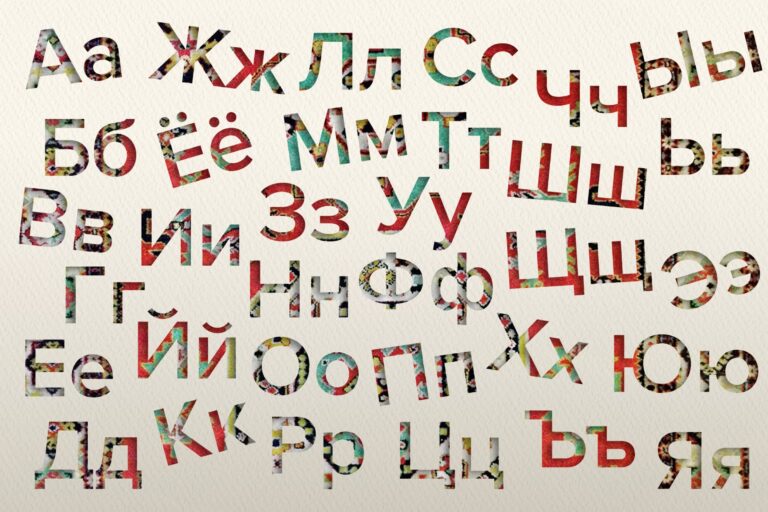100 Common Russian Expressions

When it comes to mastering Russian, there are some key phrases and expressions that will help you take a big step forward. See the guide below to learn 100 common Russian expressions you can use in everyday conversations.
They’ll help you meet new people, make your way around Russia, get help when you need it and more. Using these authentic expressions will allow you to use the Russian language the way a native speaker would
Download: This blog post is available as a convenient and portable PDF that you can take anywhere. Click here to get a copy. (Download)
Essential Russian Expressions

Let’s start with the basics. Here are some simple Russian phrases and expressions for making conversation:
| Russian | English |
|---|---|
| Здравствуйте | Hello (formal) |
| Привет | Hi / Hello (informal) |
| Доброе утро | Good morning |
| Добрый день | Good day / Good afternoon |
| Добрый вечер | Good evening |
| Пожалуйста | Please / You're welcome / Here you go |
| Спасибо | Thank you |
| Извините | Excuse me / I'm sorry (formal) |
| Извини | Excuse me / I'm sorry (informal) |
| Прошу прощения | I apologize |
| Как вас зовут?
| What's your name? (formal) |
| Как тебя зовут? | What's your name? (informal) |
| Как у вас дела́? | How are you? (formal) |
| Как дела́? | How are you? (informal) |
| Меня зовут... | My name is... |
| Что нового? | What's new? |
| Сколько вам лет? | How old are you? (formal) |
| Сколько тебе лет? | How old are you? (informal) |
| Мне … лет. | I’m… years old. |
| Где находится туалет? | Where is the restroom? |
| Я не говорю по-русски. | I don't speak Russian. |
| Я плохо говорю по-русски. | I speak Russian poorly. |
| Вы говорите по-английски? | Do you speak English? (formal) |
| Понимаю. | I understand. |
| Я не понимаю. | I don't understand. |
| Повторите, пожалуйста? | Could you please say it again? |
| Я не знаю. | I don’t know. |
| Помогите | Help! |
| Мне нужна помощь. | I need help. |
| Я голоден. | I'm hungry. |
| Я хочу пить. | I'm thirsty. |
| Можно мне немного воды? | Could I have some water? |
| Удачи! | Good luck! |
| Сколько времени? | What time is it? |
Expressions for Agreeing and Disagreeing

Once you’ve got some basic conversational expressions under your belt, it’s time to add ways to agree and disagree with your conversation partners to the mix:
| Russian | English |
|---|---|
| Я согласен. / Я согласна. | I agree. (masculine/feminine, depending on the speaker's gender) |
| Правда. | True or truth. |
| Возможно. | It's possible. |
| Само собой разумеется. | It's self-evident. |
| Конечно. | Of course. |
| Полностью согласен. | I completely agree. |
| Безусловно. | Without a doubt. |
| Абсолютно. | Absolutely. |
| Я тоже так думаю. | I think the same way. |
| Нет, наоборот. | No, it's the opposite. |
| Ты с ума́ сошёл/сошла! | You've lost your mind! (masculine/feminine, depending on the person being addressed) |
| Не согласен. | I disagree. |
| Не совсем. | Not exactly. |
| Мне кажется иначе. | I think differently. |
| Я бы поспорил... | I would argue... |
| На мой взгляд... | In my opinion... |
Russian Expressions for Eating Out

If you’re visiting Russia, you’ll no doubt be going out to eat. Here are some key phrases in case your server doesn’t speak English (or for practicing your Russian even if they do!):
| Russian | English |
|---|---|
| Мы хотели бы заказать сто́лик на двоих, пожалуйста. | We'd like to reserve a table for two, please. |
| Где находится туалет? | Where's the restroom? |
| Можно меню, пожалуйста? | Could I have the menu, please? |
| У вас есть меню на английском? | Do you have a menu in English? |
| Мы готовы сделать заказ. | We're ready to place an order. |
| Что вы порекомендуете из меню? | What would you recommend from the menu? |
| У вас есть вегетарианские блюда? | Do you have something vegetarian? |
| Могу я увидеть винную карту? | Can I see the wine list? |
| Я бы хотел/хотела... | I would like... (masculine/feminine, depending on the gender of the speaker) |
| У меня аллергия на глютен. | I'm allergic to gluten. |
| Можно мне ещё соуса? | Can I have extra sauce? |
| Можете приготовить это без лука? | Can you make it without onions? |
| Приятного аппетита. | Enjoy your meal. |
| Это блюдо очень вкусное. | This dish is very tasty. |
| Можно чек, пожалуйста? | May I have the bill, please? |
| Можно заплатить кредитной карточкой? | Can I pay by credit card? |
| Я заплачу наличными. | I will pay in cash. |
Russian Expressions for Traveling

Travel phrases are usually among the first sayings we learn, and with good reason. Here are some essential travel phrases to help you get around in Russia:
| Russian | English |
|---|---|
| Как я могу добраться до аэропорта? | How can I get to the airport? |
| Где находится мой выход на посадку? | Where is my departure gate located? |
| Как долго длится регистрация? | How long does check-in take? |
| Мой рейс отменён, что мне делать? | My flight is canceled, what should I do? |
| Мы путешествуем вместе. | We're traveling together. |
| Я хотел бы купить билет на поезд до Москвы. | I'd like to buy a train ticket to Moscow. |
| Где находится автобусная остановка? | Where is the bus stop? |
| Какой автобус идёт в центр го́рода? | Which bus goes to the city center? |
| Сколько сто́ит проезд в метро? | How much is the subway fare? |
| Я хочу купить билет. | I want to buy a ticket. |
| Мне нужно вызвать такси. | I need to call a taxi. |
| Мы планируем идти пешком до достопримечательностей. | We plan to walk to the sights. |
| Это далеко? | Is it far? |
| Скажите пожалуйста, как пройти туда? | Please tell me, how do I get there? |
| Остановитесь здесь, пожалуйста. | Stop here, please. |
| Я хотел бы забронировать номер в отеле. | I'd like to book a hotel room. |
| Когда начинается заселение? | When does check-in start? |
| Во сколько выезд из отеля? | What time is check-out from the hotel? |
| Я остался доволен сервисом в этом отеле. | I was satisfied with the service at this hotel. |
| Где я могу позавтракать поблизости? | Where can I have breakfast nearby? |
| Где я могу найти ресторан? | Where can I find a restaurant? |
Here are a few more Russian travel expressions that need a bit more of an explanation:
Сядем на дорожку
“Sitting on the road.” This expression gets at one of many Russian superstitions—sitting quietly on your suitcase before leaving to guarantee a successful trip.
It’s a nice way to leave behind any lingering stress from packing and to get excited for the journey ahead.
Пора идти! (It’s time to go!)
Сядем на дорожку. (Let’s sit for the road.)
Ты будешь / вы будете … ?
These are the formal and informal future forms of the verb быть which means “to be,” but they’re used to mean “Do you want…?” or “Would you like?”
If you’re ever a guest in a Russian home, get ready to be asked this question in relation to food and drink over and over.
Вы будете чай или кофе? (Would you like tea or coffee?)
Вы не подскажете?
Here’s the most authentic way to ask for directions on the confusing Russian streets. First say “Вы не подскажете?” (Won’t you give me a hint?) and then tell them where you need to go. For example:
Извините, вы не подскажете, как проехать до ближайшего метро? (Excuse me, could you please advise on how to get to the nearest subway?)
Вы выходите на следующей?
You’ll hear this on every crowded bus and metro car. Someone behind you will use this expression to ask, “Are you getting off at the next (stop)?” If the answer is no, move aside so the questioner can get closer to the exit.
Or you can say “Нет, но я вас выпущу” (No, but I’ll let you out). That means when a bus or train stops, you actually step out to allow people behind you to leave and then jump right back in.
If the answer is yes, the person behind you is expecting you to make a hasty exit from the train or bus.
Как ты съездил? (informal, masculine) / Как ты съездила? (informal, feminine) / Как вы съездили? (formal/plural)
Russians will ask you this when you return from a journey, with the meaning, “How was your trip?”
Как вы съездили в командировку? Всё прошло хорошо? (How was your business trip? Did everything go well?)
Unique Russian Expressions for Conversation

To really understand what your Russian friends are saying and to make yourself understood, it’s worth learning some common expressions unique to the Russian language. Here are a handful to get you started:
Беспредел
Translated, it means, “without boundaries; bedlam; lawlessness; where’s this world going?” Russians use this to express disbelief and a little bit of awe. They might use it in a sentence like the following while shaking their head:
Миша вернулся домой из клуба только в 7 утра. Беспредел! (Misha didn’t get home from the club until 7 a.m. Mayhem!)
Да нет
Russians use this expression to mean “not really.” It can be used to express disagreement, politely decline an offer or invitation, or express doubt or uncertainty.
Ты думаешь, что он придёт? (Do you think he will come?)
Да нет, не уверен. (Not really, I’m not sure.)
Да ты/вы что
This Russian phrase is used to express surprise, disbelief or amazement. Remember that ты is the informal singular “you” and вы is the formal or plural “you.”
Я сдал экзамен с первой попытки! (I passed the exam on my first try!)
Да ты что! Это отлично! (No way! That’s great!)
Давай
Давай means “give,” but Russians have made it into a multipurpose word, using it as shorthand for “come on,” “let’s go” or “let’s do it.” It can even be used as a very informal “bye.” Spend any time in Russia and you’ll hear this word a lot! For example:
Давай, ты сможешь! (Come on, you can do it!)
Давай пойдем в кино? (Let’s go to the movies?)
Давай, увидимся! (Bye, see you!).
Ничего себе
This one literally means, “nothing to oneself.” This saying expresses mild disbelief and/or interest with a twinge of envy, as in:
Она запустила собственный бизнес и теперь у нее множество клиентов. (She started her own business, and now she has many clients.)
Ничего себе! (No way!)
Кошмар, Ужас
“Nightmare, horror.” These are the filler words you can use to respond to someone telling you about something bad that happened to them or about the drama in their life.
Я попал в аварию, но, слава богу, ничего страшного. (I got into an accident, but thankfully, nothing serious.)
Ужас, надеюсь, ты в порядке! (Horror, I hope you’re okay!)
Целую
“I kiss [you].” Close friends, usually women, will close a conversation with this sweet expression. You can use it as a closing in written communications with friends, too.
Пока! Целую! (Goodbye! Kisses!)
PG-13 Expressions
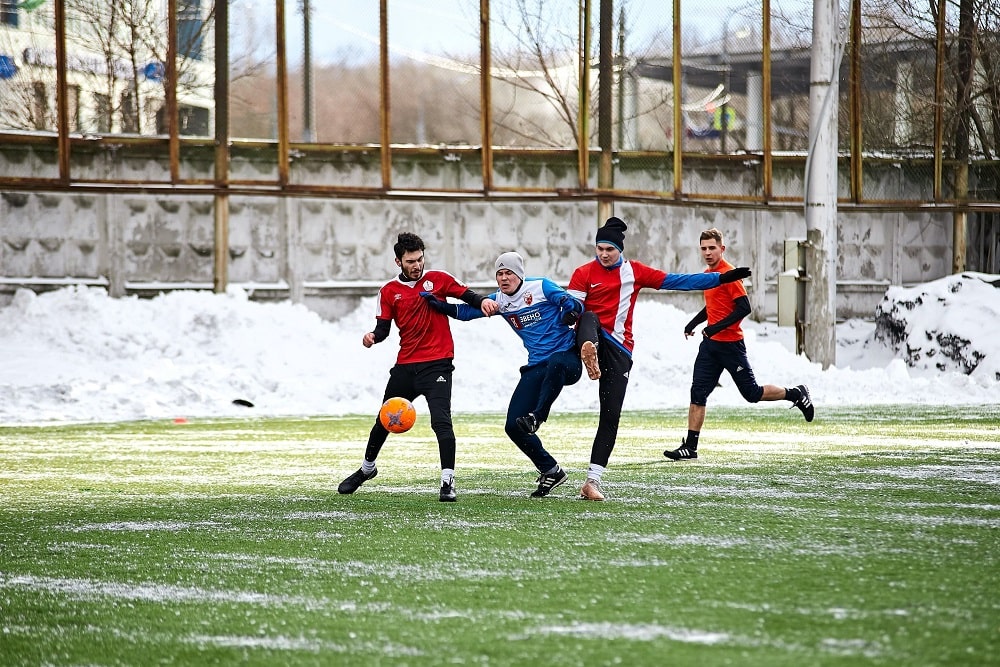
No list of expressions would be complete without some swear words, or at least some more polite alternatives for swear words.
Блин
Блины are tasty thin pancakes, similar to crepes. But блин on its own is similar to “Shoot!” or “Darn!”
Блин, забыл зонтик и теперь идёт дождь. (Darn, I forgot my umbrella, and now it’s raining.)
Ё-моё
A modification of one of the more common Russian expletives, ё-моё is useful for expressing surprise with a side of anguish or despair.
Я потерял кошелёк с деньгами и документами! (I lost my wallet with money and documents!)
Ё-моё, как это могло случиться?! (Oh my goodness, how could that happen?!)
Тормоз
Тормозить means to brake, so тормоз refers to someone who’s slow in understanding or acting, similar to “slowpoke” or “dimwit” in English.
It can be considered somewhat derogatory and is typically used in a teasing or mildly critical manner.
Не будь тормозом. (Don’t be a slowpoke.)
Tools to Practice Common Russian Expressions
In addition to the starter pack of Russian expressions listed above, there are plenty of great online resources for learning even more Russian expressions.
- MasterRussian.com: This site has a lot of Russian-language resources, broken down by topic area and split into lessons. There’s even an entire section on common proverbs and sayings.
- FluentU: FluentU’s tool of choice for language learning is video-based media. From these videos, you can listen to native Russian speech, which will be jam-packed with expressions.
FluentU takes authentic videos—like music videos, movie trailers, news and inspiring talks—and turns them into personalized language learning lessons.
You can try FluentU for free for 2 weeks. Check out the website or download the iOS app or Android app.
P.S. Click here to take advantage of our current sale! (Expires at the end of this month.)
- YouTube: YouTube has loads of Russian-language resources. There are many short videos covering basic and intermediate phrases.
Now you have a long list of common Russian expressions.
Bookmark this page and keep coming back to it. Try to learn a few more phrases every day, and you’ll soon have them all down!
Download: This blog post is available as a convenient and portable PDF that you can take anywhere. Click here to get a copy. (Download)
And One More Thing...
If you love learning Russian and want to immerse yourself with authentic materials from Russia, then I should also tell you more about FluentU.
FluentU naturally and gradually eases you into learning the Russian language and culture. You'll learn real Russian as it's spoken by real Russian people!
FluentU has a very broad range of contemporary videos. Just a quick look will give you an idea of the variety of Russian-language content available on FluentU:
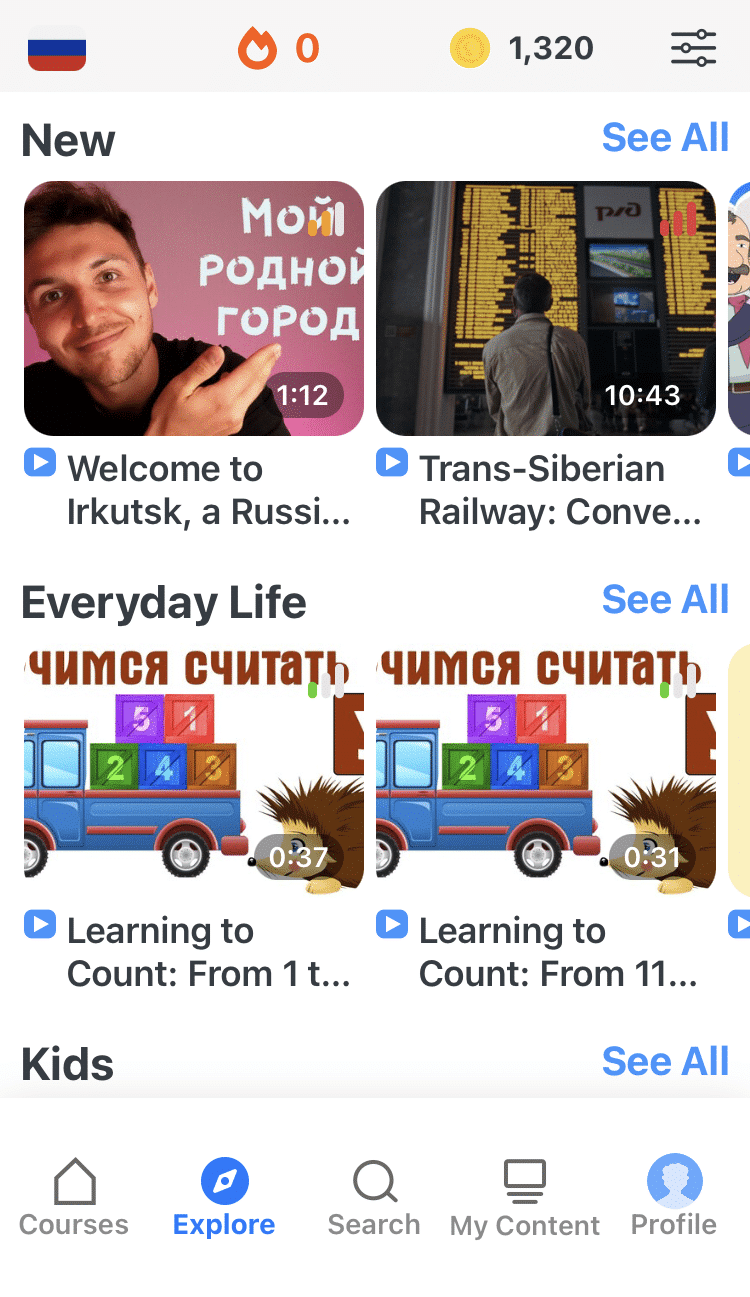
FluentU makes these native Russian videos approachable through interactive transcripts. Tap on any word to look it up instantly.
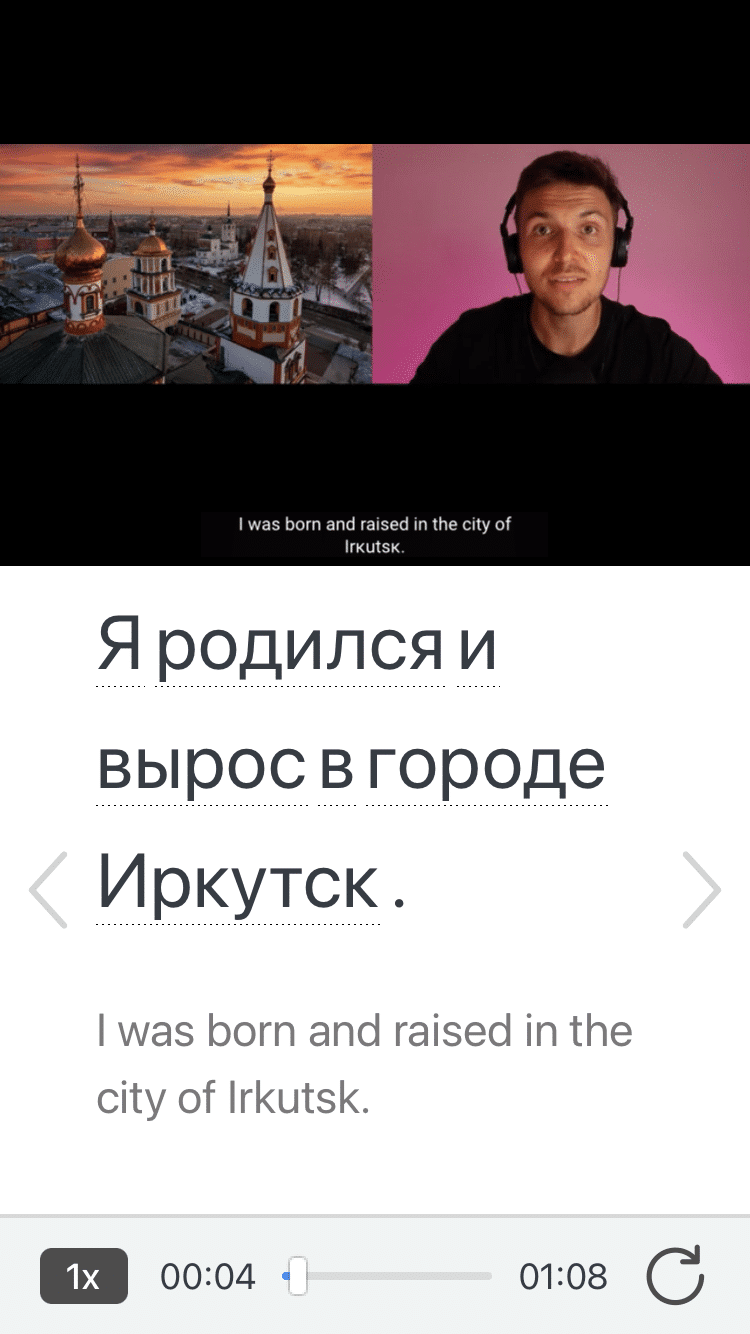
Access a complete interactive transcript of every video under the Dialogue tab. Easily review words and phrases with audio under Vocab.

All definitions have multiple examples, and they're written for Russian learners like you. Tap to add words you'd like to review to a vocab list.
And FluentU has a learn mode which turns every video into a language learning lesson. You can always swipe left or right to see more examples.
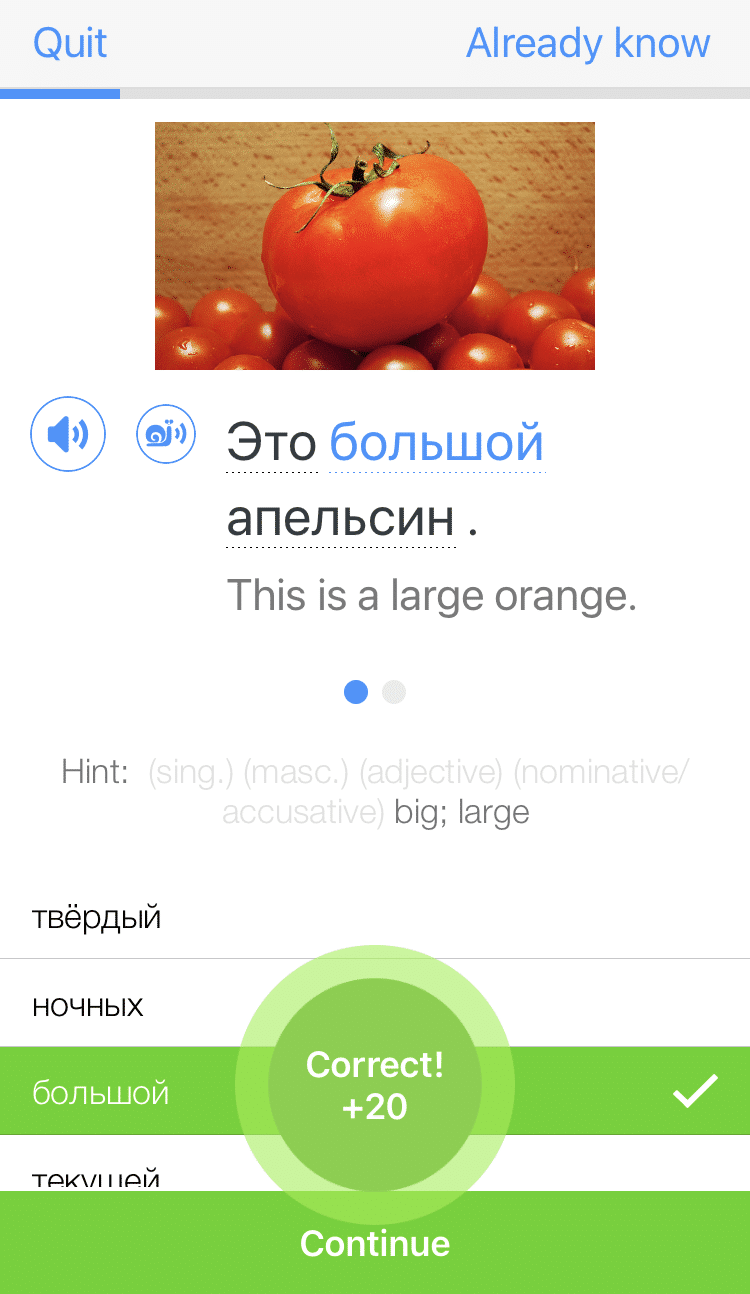
The best part? FluentU keeps track of your vocabulary, and gives you extra practice with difficult words. It'll even remind you when it’s time to review what you’ve learned. You'll have a 100% personalized experience.
Start using the FluentU website on your computer or tablet or, better yet, download the FluentU app from the iTunes or Google Play store. Click here to take advantage of our current sale! (Expires at the end of this month.)





